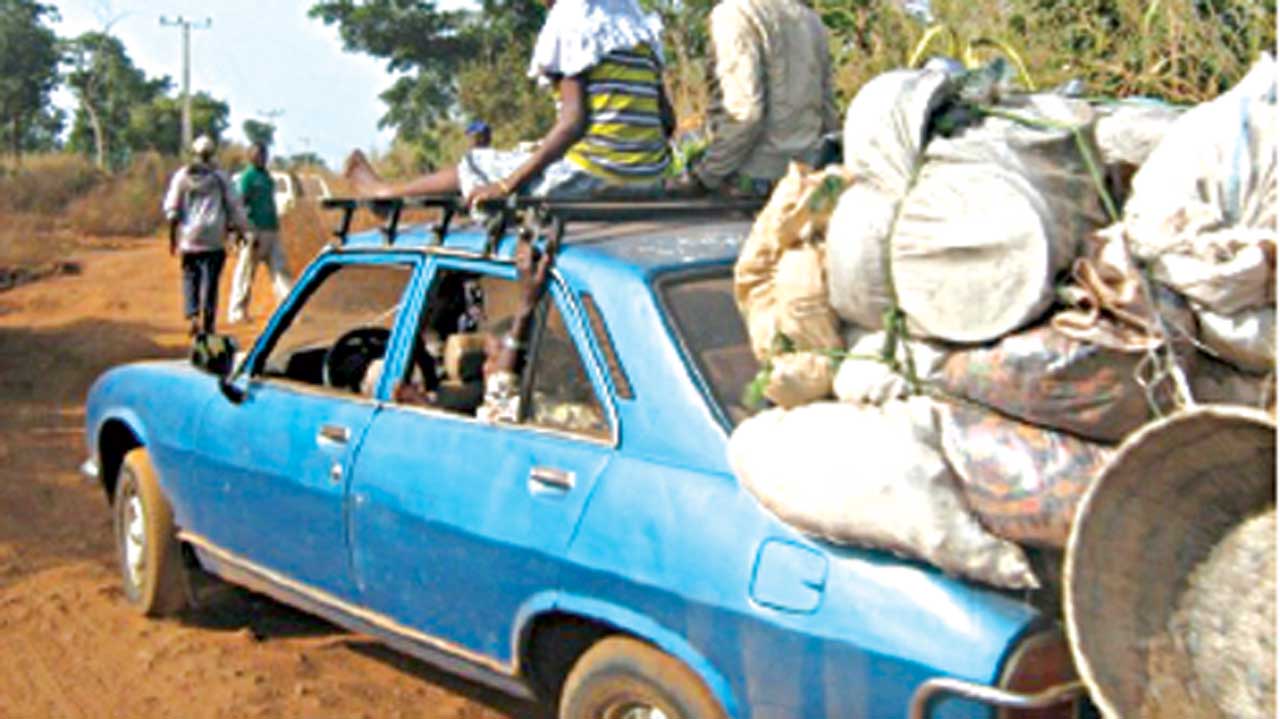
• Tinubu Urged To Channel Subsidy Funds Into Fixing International Roads
Nigeria is currently losing over N60 billion to uncoordinated cross-border trade at Okerete border in Saki West area of Oyo State.
Investigations by The Guardian revealed that the border, which is currently in a sorry state, has become a smugglers’ den due to lack formal Customs entry point that could have streamlined movement of goods in and out of the country.
Traders told The Guardian that the border is currently operating as a bush path that makes international trade activities rigorous.
The trading activities involve river-crossing with canoes.
According to them, efforts of Customs at the border are limited due to the poor and exposed terrain, as they only mount roadblocks to check goods.
The Okerete border has been existing since 1800 and has been used by West African traders as a key crossroad between Dakar, Bamako, Ouagadougou, Djougou, Kilibo, Saki, Ilorin, Maiduguri, Kussiri, Ndjamena and Saki, Ibadan, Onitsha, Ikom, Kumba and Douala.
Okerete is about 22 kilometres away from the Trans-Benin highway and 15 kilometres from the railway line that links Cotonou Port with Parakou. It has, therefore, excellent linkages to Northern parts of
ECOWAS nations such as Burkina Faso, Mali, Niger and Chad.
On the Nigerian territory, Okerete is linked by an unpaved road to Saki (60 kilometres), which is linked to Ibadan, Ilorin, Abuja at 759 kilometres, and Lagos at 400 kilometres.
To traders’ dismay, Okerete has been operating without a formal checkpoint, characterised by bad road, lack of electricity, lack of hospital, and lack of pipe borne water, among others.
A trader and Executive President, West African Association for Cross-Border Trade, in Agro-forestry-pastoral, Fisheries products and Food (WACTAF), Alhaji Salami Nasiru Alasoadua, told The Guardian that Nigeria is losing huge potentials to the poor border.
He said the former Comptroller-General of Customs, Abdullahi Dikko claimed that the Customs can only have temporary office at the border, as it does not have powers to establish a standard entry point.
“But our efforts to get the senate to approve the project has not been futile. You can imagine, where we have representatives and senators, all of them have received the documents, but refused to work on it. Even the past governor of Oyo State received the document but failed to do something about it,” he said.
According to him, a British firm had undertaken a study worth about £3 million to help Nigeria develop a standard border entry point that would facility trade and increase revenue generation for the government.
Alasoadua said former President Olusegun Obasanjo initiated the project, but his successors shunned the idea. He, therefore, called on President Bola Ahmed Tinubu to urgently revisit the project to buoy his economic recovery agenda and generate more revenue to government coffers.
At present, the Federal Government has removed fuel subsidy, it was recommended that some of the subsidy fund could be allocated to road rehabilitation programmes throughout the nation and particularly linking the borders to international community.
He said the project would reduce transport cost and time. He stressed the benefit of wider economic development of international and local markets, logistic centres and subsequently employment along the new corridor.
The £3 million feasibility study conducted by a British Firm, Crown Agents, suggested that the Nigerian government should construct a bridge across the river and generate more revenue from bridge tolls and from increased Customs revenues.
The study, obtained by The Guardian, revealed that, if trade is facilitated in the corridor, at least an additional N60 billion yearly would be collected by the Nigerian Customs.
Agricultural products and cattle are traded in a number of local markets through Saki to Ibadan and Lagos. The products include yam-flower, yam, shea butter, maize, soya beans, cashew nut, cassava and livestock, such as cows and goats.
As a result of the poor crossing and road conditions in Oyo State (and neighbouring States), the trading of goods is limited in consignment size.
The study stated: “The potential catchment area of the new corridor is enormous. Outside Nigeria, it is estimated at over 20 million people of the total of 139 million inhabitants in the nine regional trading partners of Nigeria
“Within Nigeria, the potential market catchment area consists of the six states in the southwest of Nigeria, which have a population of around 50 million inhabitants. This catchment area is of sufficient size to allow the establishment of logistic centres to optimise the supply chain of products to and from other nations within (and outside of) the ECOWAS region.
“Private sector stakeholders have produced estimates that claim that a border crossing at Okerete will generate the movement of 500,000 tons of goods per annum between ECOWAS landlocked cities and central Africa for the first year due to the attractive logistics passing the Okerete corridor.
“Stakeholders estimate that over 350,000 cattle will be transported per year through this route, which is equivalent to 7,000 lorries per year. It is also thought that the trade of hides, skin and other meat products, and smoked fish will also grow,” it stated.
Noting that each of the Nigerian states operates a number of check posts and mobile inspection teams to combat illegal trade, it stated that cross border traders also need to register the goods at a specific Customs check point in Oyo State.
“Smuggling affects border villages socially. Security and inspection teams are present at or near borders, and sometimes exchange gunfire with smugglers. Furthermore, high levels of youth unemployment equates to plenty of ready recruits for conveying prohibited commodities across the border,” it stated.
It also suggested that the funding of the public portion of investments could be done from the national budget, or in combination with Oyo State resources, with or without credit facilities from financial institutions or donors.
However, Customs authorities in Nigeria, and especially in Oyo State, have increased their effort to combat smuggling. The efforts have paid off in terms of seizures of illegally imported goods worth N192 million in the last seven months of 2022. Meanwhile, it generated N46 billion revenue within the same period.
When contacted, Customs Public Relations Officer, Oyo/Osun Command, Kayode Wey said the Okerete border is not an approved border entry point.
He said: “If it is an approved border entry point, government would have gazetted it, put necessary facilities in place and put officers there. Notwithstanding, our officers are constantly patrolling the place effectively to ensure that no illicit item comes into the country through that route.”
Wey said the Customs are always combing the route effectively to ensure that smuggling is reduced to the barest minimum, adding that officers of the Strike Force team and the Federal Operations Unit (FOU) are also involved in the routine patrol to ensure that smuggling is curtailed in that area.
He said the approval of the border has nothing to do with Customs but the Federal Government, while some processes are to be followed. He appealed to the traders and other stakeholders at Okerete border to exercise patience, while things are put into proper perspective.






